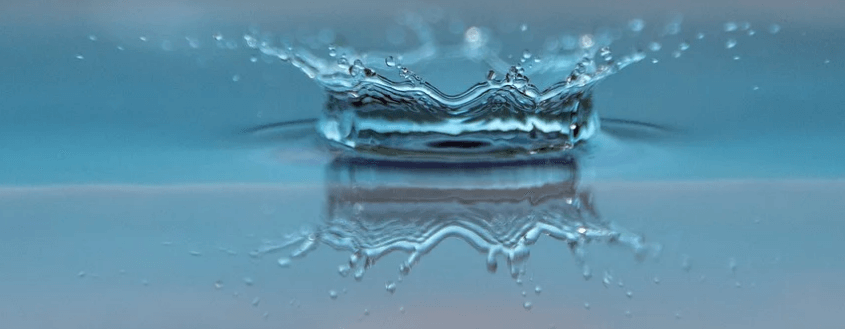
Water is classified as hard and soft, depending on the dissolved elements of it. You may have questions about the hardness and softness of your water. We know that water has no color. It looks crystal and clear. But water contains different types of minerals and chemicals. The concentration of certain minerals causes the water hard. But, is hard water or soft water better for you? This article is all about soft vs hard water.
Soft vs Hard Water: What is hard water?
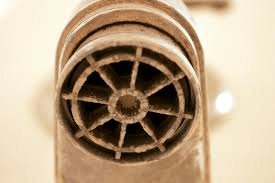
Hard water is water that contains a high amount of calcium, magnesium, sulfurs or many other minerals. It’s a natural process. When rains fall on the ground, it passes through the deposits of limestone, chalk or gypsum and made up magnesium, carbonates, bicarbonates, and sulfate. These elements make the water hard.
Hard water is water that contains a high amount of calcium, magnesium, sulfurs or many other minerals. When rains fall on the ground, it passes through the deposits of limestone, chalk or gypsum and made up magnesium, carbonates, bicarbonates, and sulfate. These elements make the water hard.
Hard water has some health benefits but many people face different problems with hard water. It causes critical problems of industrial instruments and home appliances. Hard water can harm many industrial pieces of equipment like cooling towers, boilers and others that are connected to water. In your home, hard water can harm your precious appliances and plumbing settings. You may see the formation of limescale in your kettles, water heater, and water pods. You may also notice that, when you use soap, shampoo or detergent, it forms less foam. How to reduce the bad effects of hard water? Most people use a water softener to reduce hard water problems. Water softener softens the hard water. But what is soft water? Let’s see-
Soft vs Hard Water: What is soft water?
We use the term “soft water” when it contains a low concentration of magnesium and calcium. Such water naturally occurs where the drainage basins of rivers are formed of hard and calcium poor rooks. For example, Snowdonia Wales is such a place. The definition of soft water we use is not 100% correct because the water may also contain elevated levels of sodium and bicarbonate ions.
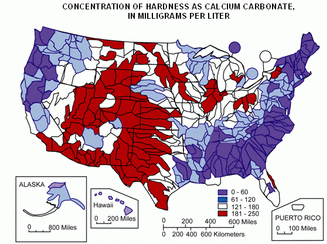
However, soft water has few calcium ions but no soap scum is formed in regular washing. There is no inhibition of the lathering action of soaps. Soft water does not produce calcium deposits in water heating appliances. The definition of soft water may vary to depend on the country or state. In the UK, less than 50 mg/l of calcium carbonate contaminated water is regarded as soft water. On the other hand, In the USA, water is classified as soft if the calcium carbonate is less than 60 mg per liter. Most of the states in the US have a hard water problem and people usually use water softening technology.
Advantages of hard water
Hard water has some positive sides. What are the advantages of hard water?
- Hard water contains a large amount of essential minerals. These minerals are helpful for our body.
- It is useful for preventing certain types of heart and cardiovascular diseases.
- Naturally, hard water tastes better than soft water.
Disadvantages of hard water
Hard water has lots of disadvantages. Now we will know about the disadvantages of hard water.
- Hard water can reduce the lifespan of your plumbing settings and water appliances.
- It will make your clothes less bright and rough after a few washes.
- It can make your skin dry and causes eczema, especially in children.
- Hard water will cost you more than natural. You may need more soap, detergent, and other cleaning ingredients.
- Hard water may leave spots on glasses and silverware.
- Hard water minerals can deposit in the interior side of the pipe and reduce water flow.
You might understand the deference from soft vs hard water comparison.
Signs of hard water
1.Mineral build-up
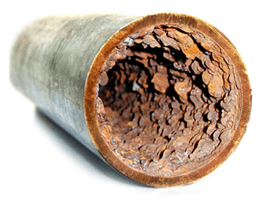
2. Funny smells or tastes
You may notice some materials build up around your water fixtures and faucets. You may also notice that the water flow of your plumbing line is becoming low day by day. But what is the reason for the drop in water flow? It’s the mineral build-up of hard water. When hard water passes through the waterline, it deposits containing minerals around the fixtures.
3. Soap scum on bathtub, curtain or dishes
It’s the most visible sign of hard water. When you use soap or shampoo, it mixed with contaminated hard water and left white filmy soap scum residue. You may also notice it on your glassware or dishes. These are the calcium deposits left by hard water.
4. Dry skin and dull hair
Many people experience dry or itchy skin with rash. Some also notice the dull hair of their family members. Have you or your family experienced these? If yes, then look to your home water. Because of the minerals in the hard water, it can’t fully rinse off soap, shampoos or conditioner from your hair and skin.

The residues of shampoo, conditioner or soap make dry skin and dull hair. Bathing in hard water may cause skin irritation. It’s a sign of hard water.
5. Digny laundry
Clothes will show a sign of your home water. You may notice that your white clothes are becoming grey or less bright after a few washes. It’s the bad effect of hard water. Hard water can make rough your new bedsheets within a few days. It also can shorten the lifetime of your clothes. If you have faced these problems, be sure, you are using hard water.
How to test water hardness?
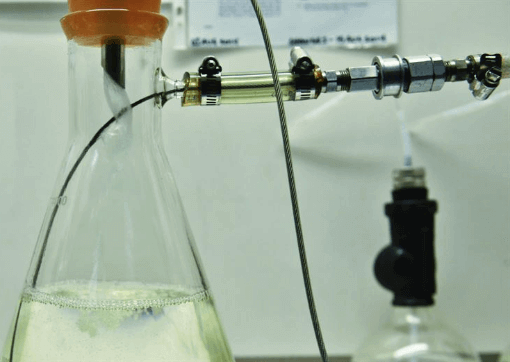
Already you have known about the major signs of hard water. You can fix the problem by seeing these signs. You can test your water by using your dishwashing liquid or with a test kit.
1. Dishwashing liquid test
For this purpose, you will need a water bottle with a cap and dishwashing liquid. At first, fill the bottle about halfway with water and add 4/5 drops of dishwashing liquid. Then start shaking strongly until it makes foam. If the foam stays a few minutes, then your water is soft. If not, then it is hard water.
2. Water test kit
It’s important to know the actual hardness level of your home water. For that, you will need a water test kit. It is available in many places, even online. You can collect the best home water testing kit from there. Firstly, you need to fill a test tube with the water in your home. Then add a drop of solution and shake it about 10 seconds. You should not stop adding drops and shaking before sustaining a half-inch of suds. Each drop is equivalent to 1 grain of hardness. If your result is less than 3, then it is slightly hard. If you get results higher than 3, you should consider treating the water.
Soft vs Hard Water: Which water is better?
Now we know the difference between soft vs hard water. As mentioned earlier, hard water contains natural minerals which are necessary for our body. If you drink hard water, you will get these beneficial elements. But some studies proved that it is possible to fill the daily needs of necessary minerals by eating regular food. As a result, most of the people search buying guide and select appropriate water softener. Some of them opted to have both hard and soft water. For this purpose, they have separate hard water supply lines from their water softening system. Now, you may consider this formula for your home.
Soft vs Hard Water: Ultimate solution to hard water problems
Hard water is not so harmful to our bodies. It harms our home appliances. You can solve these problems in different ways. A water softener is the ultimate solution to this critical problem. There are a lot of water softeners in the market. You can choose the best water softener from them. Water softener removes the hardness of water and produce soft water. But you should consider some important things before selecting any water softener. It’s important to determine the actual hardness level of your water. Knowing the hardness level will help you to select the exact water softener for your home. It also prevents you from buying unnecessary and expensive items. Everyone wants affordable and necessary goods. You need not buy high performing ones if the hardness level of your water is low. You have to choose a water softener that is perfect for your home.
Final words
After knowing all about soft vs hard water, it will be easy for you to make a decision. You can use hard or both hard and soft water. For this, you will need a separate plumbing line for the water softening system. Now, decide which water will be better for you and your family.

Hi, this is Sirazul Islam, working in a government research organization. I’ve been an instrument specialist for over 5 years. I love to write reviews and tell people about the best products that are out there.
I use my expertise and impartial eye to find the best water softener, kitchenware, cookware, and more. Learn more at this link:

3 thoughts on “Soft vs Hard Water: Which One Is Better?”